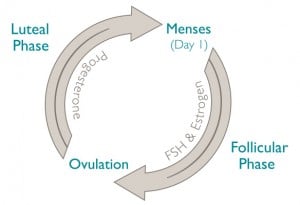
Medical contribution by Naveed Khan, M.D., of Shady Grove Fertility’s Leesburg, VA, office
When you hear the words ‘menstrual cycle,’ you may automatically assume that it’s just a more clinical way of describing your period. But your menstrual cycle is actually much more than that and has the potential to affect your fertility. Thus, when you are having trouble trying to conceive, it’s very important for your physician to gather information about your menstrual cycle in order to help establish an accurate diagnosis and treatment plan.
What is Your Menstrual Cycle?
The menstrual cycle is a series of changes that a woman’s body goes through each month in which the ovary releases an egg and the uterus prepares for pregnancy. This cycle can be divided into two phases: the follicular phase and the luteal phase.
- The follicular phase

The first day of your period (or menses) is day 1 of your cycle and the start of the follicular phase. During this time, the brain releases follicle-stimulating hormone (FSH) to stimulate the development of a single dominant follicle that contains one egg. While the follicle matures, it will release estrogen to stimulate the growth of the uterine lining. Once ovulation begins, the follicular phase has concluded. While this phase averages about 14 days, the length can vary, creating variations in total cycle length.
- The luteal phase
The luteal phase begins with ovulation and continues until the onset of your period. During this phase, the ovary will release progesterone—a hormone that matures the uterine lining and prepares it for the implantation of an embryo. If pregnancy does not occur, the progesterone level drops and bleeding occurs. This phase can average 14 days.
Does Cycle Length Matter?
The length of your menstrual cycle is determined by the number of days from the first day of bleeding to the start of the next period. The length of your cycle—while not on any form of birth control—can be a key indicator of hormonal imbalances and whether or not ovulation is occurring in a regular manner. If ovulation does not occur, pregnancy is not possible.
- Normal menstrual cycle

A normal menstrual cycle lasts from 21 to 35 days. If you have a normal menstrual cycle, regular ovulation should be occurring and all hormones should be in balance, making natural conception possible.
- Short menstrual cycle

A short menstrual cycle is anything shorter than 21 days. Shortened cycles can be an indication that the ovaries contain fewer eggs and that menopause may be approaching. As the number of eggs in the ovaries decrease, the brain releases more FSH to stimulate the ovaries to develop a follicle. This results in earlier development of the follicle and earlier ovulation, creating shortened cycles. This can make conception more difficult.
- Long or irregular menstrual cycle

A long menstrual cycle lasts more than 35 days. Longer cycles are an indicator that ovulation is not occurring or at least not occurring in a regular manner. This lack of ovulation is known as anovulation. There are many potential causes of anovulation, such as:
- irregularities with the thyroid gland
- elevations of the hormone prolactin that can disrupt the brain’s ability to communicate with the ovary
- polycystic ovary syndrome (PCOS)
These hormonal imbalances lead to problems with ovulation and fertility, but they may also increase the risk of miscarriage.
What Does it Mean if Menstrual Bleeding Lasts More than 7 Days?
The normal length of bleeding for women is 2 to 7 days. Anything longer than 7 days is known as prolonged bleeding. Prolonged bleeding tells your physician that either ovulation is not occurring regularly or that there may be something disrupting the lining of the uterus. There also could be a problem forming blood clots. Prolonged bleeding can occur if the aforementioned ovulation is not occurring regularly. Additionally, prolonged bleeding can be caused by polyps, fibroids, or infection within the uterus or cervix. In these situations, if an embryo should enter the uterus, implantation can be compromised, resulting in lower pregnancy rates or an increased chance of miscarriage. Although rare, a problem with blood clotting can also cause prolonged bleeding, which would necessitate an evaluation from a specialist.
What if I Never Menstruate?
If you never menstruate, ovulation is not occurring and conception would be difficult without intervention. This can be common in women who are considered underweight by body mass index (BMI) standards. The body requires a certain level of body fat for menstrual cycles and reproduction to occur. Weight is not the only cause to consider, though. If a woman has never had menstrual bleeding, there may have been a problem with the normal development of the uterus or the vagina. If a woman had menstrual cycles previously, but then stopped, this could be due to a problem with the uterus itself, due to scar tissue inside the uterine cavity or premature menopause. If the uterus has not formed or if menopause has occurred, pregnancy is not possible.
Can I Still Conceive if My Menstrual Cycle is Not Normal?
Yes, even if your menstrual cycle is abnormal, you may still conceive on your own. However, it may be a little more challenging, especially if you’re trying to determine your most fertile window based on your menstrual cycle. It’s important to realize that there are many situations in which ovulation does not occur, and thus, conception cannot occur naturally. There are also instances in which scar tissue in the uterine cavity or premature menopause can be factors limiting conception. Despite these factors though, fertility treatment can help you conceive. There are basic treatment options and more advanced reproductive technologies—like in vitro fertilization (IVF) or donor egg treatment for premenopausal patients—that can help.
When Should I Seek Help?
If you suspect you are not ovulating and/or you’re experiencing abnormal periods, you should seek help from a specialist whenever you are ready to conceive. Often times, a Clomid regimen can help your body re-establish normal ovulation.
Even if you do have a normal menstrual cycle, though, you should seek help from a specialist if you have not conceived in the following time frames: if you are under the age of 35 and have been trying for more than 1 year; if you are over 35 and have been trying to conceive for 6 months; and if you are over 40 and have been trying to conceive for 3 months or less. Seeking help from a specialist will provide you with the answers you’ve been looking for.
If you would like to learn more about fertility and your menstrual cycle or to schedule an appointment, please speak with one of our New Patient Liaisons at 877-971-7755 to schedule an appointment.





